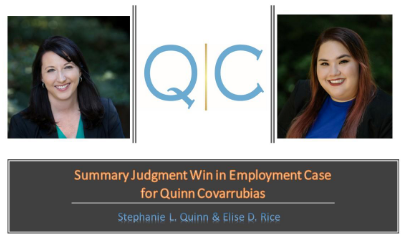Quinn Covarrubias achieved a victory in an employment law case on behalf of a public entity client and one of its managers. The suit alleged that the plaintiff was retaliated against for making complaints to his supervisor and to the entity’s human resources department about how overtime was being allocated. The plaintiff claimed that because of his complaints, as well as his age and national origin, he was denied promotional opportunities. He filed his case in Sacramento County Superior Court, asserting causes of action for retaliation under the California Fair Employment and Housing Act (FEHA) and California Labor Code section 1102.5. He also asserted claims for discrimination and harassment under the FEHA, as well as a claim for failure to prevent discrimination and harassment.
On behalf of our clients, we filed a motion for summary judgment, or in the alternative, for summary adjudication of issues, challenging each cause of action. The defense presented undisputed evidence that the defendants made each of the hiring decisions for legitimate, non-retaliatory and non-discriminatory reasons. The plaintiff’s subjective belief that he was the most qualified candidate for the jobs he sought or his “intuition” that his overtime complaints or protected characteristics played a role in the promotional decisions, was not enough to raise a triable issue of material fact. For the harassment claim, the Court recognized that trivial, occasional, and isolated alleged comments are not actionable under the FEHA, citing Etter v. Veriflo Corp. (1998) 67 Cal.App.4th 457, 464. The plaintiff asserted that his manager made offensive comments to him on two or three occasions, an accusation the manager denied. The Court found that even if these comments were made, they did not rise to the level of severe or pervasive conduct. The Court found in favor of our clients on each of the causes of action, granting summary judgment and ending the case after over two years of litigation.

